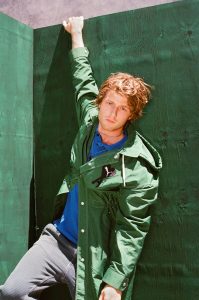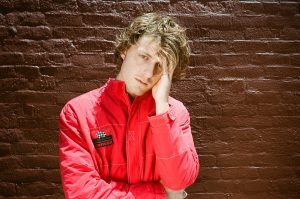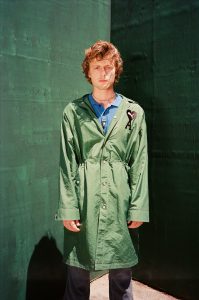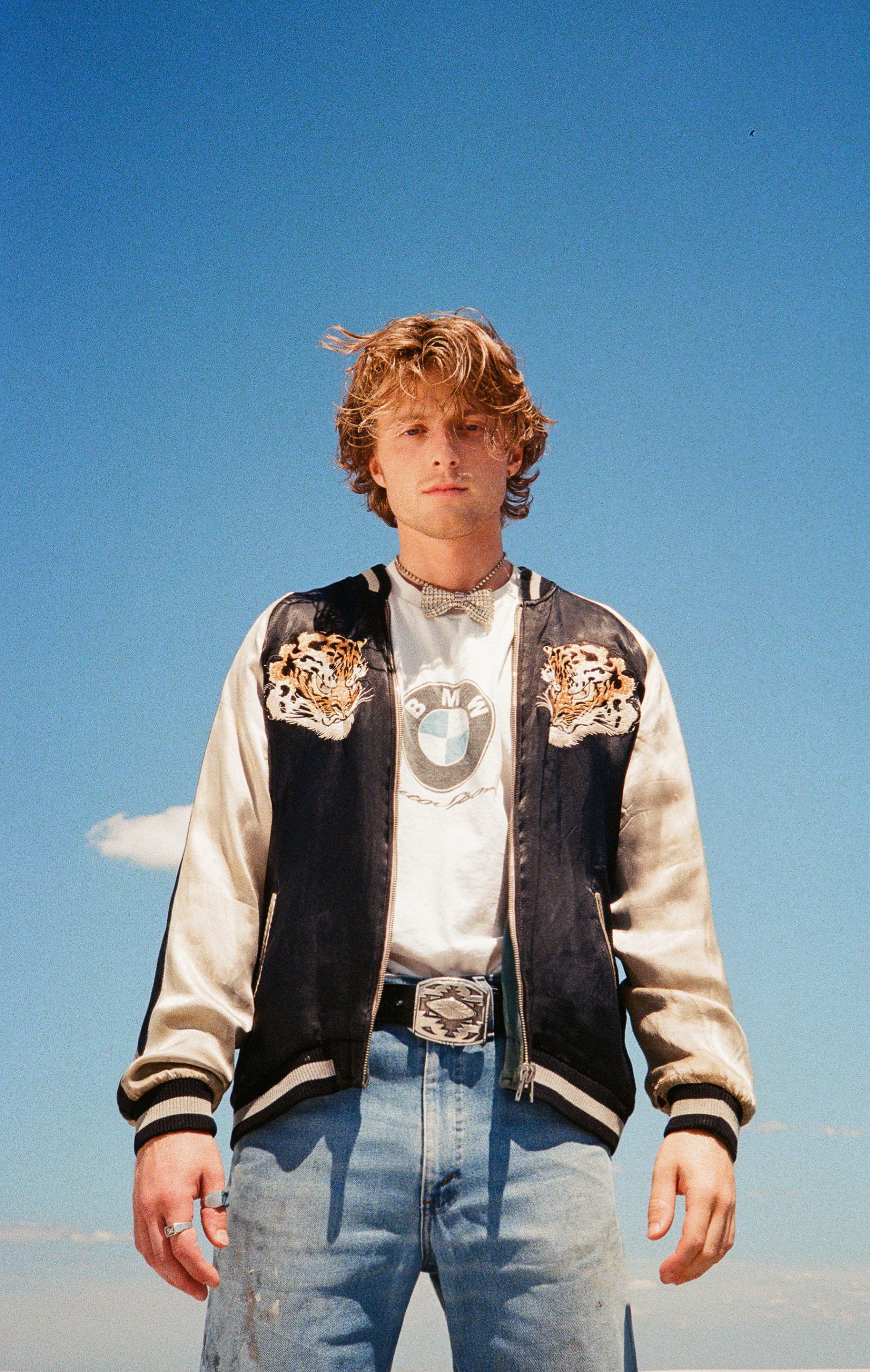Pedro Correa and I were supposed to eat at Jack’s Wife Freda. When we arrived at the Williamsburg location, one that Correa says he’s already eaten at three times this week, it was impossible to find a table, let alone a quiet place to talk. After a short walk, we ended up at a nearby taqueria, talking about our parents over a plate of chips and guacamole and likely frustrating the wait staff that gave us two menus to fill out but insisted we only write on one of them.
In “My Dead Dad,” which Correa produced and co-wrote, he plays Lucas Varela, a twenty-something burnout who moves back to Los Angeles after hearing of his father’s sudden death from lung cancer. In his will, Varela’s father leaves Lucas an apartment building he is now responsible for managing. With the help of his philosophical super, played by Raymond Cruz, Varela learns the meaning of community through his experiences with the tenants and old friends from the LA skateboarding scene.
It was difficult to avoid the topic of generational trauma, sitting across from the guy who made a movie called “My Dead Dad,” and neither of us tried. Correa was forthcoming and, as the title of his film suggests, unafraid to speak candidly about his family. “When I was 14, I hadn’t heard from my dad in years and years after my parents’ divorce,” he told me. “And one day he called me. I was shocked to hear from him in the first place, let alone be able to understand him. He’s got a thick Peruvian accent and he was losing his English,” he said.
The call was prompted by a lung cancer diagnosis that was supposed to leave Correa’s father dead within the month. “He had an apartment building in Peru where he was living, and he told me I was going to be responsible for it,” Correa shared, “and then he hung up.” Correa waited, day after day, for the call that his father had passed. “That anxiety inspired the seed idea for [‘My Dead Dad’].” Unlike his character in the film, Correa’s father miraculously recovered, having one of his lungs removed in the process.
“I ended up meeting with him later as an adult and we sort of reconnected a little bit,” Correa said timidly. “More as, like, a bro or a friend than a dad, you know?” he mused. “But I wanted to do something with that anxiety that I had from when I was a kid to illustrate that reconnection.” With the idea in place, Correa needed a spark of inspiration to get the ball rolling. He happened to find it in an unexpected place, inside his own home.

Pictured: Pedro Correa
Photographed by: Stephanie Furtun
Styled by: Sophie Lane Curtis
“I started working with a friend of mine who had made this video called ‘Drive 2: The Uber Years,’” a satirical take on 2011’s “Drive” that reimagines the nameless protagonist as a rideshare driver following the events of the film. During production, Correa met Fabio Frey, the director who would go on to co-write and helm “My Dead Dad” with him just a couple of years later. “We were actually in my apartment in Hollywood. I had this thermostat in there,” he explained. It was not just any thermostat, but one that had been “repaired” by the landlord to look like a light switch.
“Fabio came over,” Correa tells me, “and [he saw me] go over and flip a switch. It was either zero degrees or, like, 5000 degrees. And we just started talking about how shitty of a landlord [I had] and thought there was something there.” From there, it was just a matter of connecting the seed idea to what he and Frey were cooking up in Correa’s apartment. “The plan was to make it on no budget, literally,” he explained. “I had a camera from the days that I used to shoot for magazines. It was going to be, like, four other people and friends who were actors.”
But as time went on, the project just kept getting bigger, and Correa realized he had something special on his hands. “We got more experienced, less idiotic people than ourselves on the project,” he said, laughing. “We ended up with this super cool team of people who made the movie way bigger than we thought it would ever be.” Among those people was a casting director named Rick Montgomery, who worked on the movie “Green Book” and gave Correa a shot when no one else would. “We talked, and he ended up just believing in us enough to hop on and help us get people like Simon Rex, Raymond Cruz, Steven Bauer, and Chris Pontius,” he remarked.
Concerning the writing process, Correa’s experience was akin to the horror stories one hears from young filmmakers attempting to get their first feature off the ground. “I hate it,” Correa claimed of writing. “It’s miserable and it’s time-consuming, but I need to do it. It’s the most fulfilling thing in the world once you’ve written something,” he told me. With “My Dead Dad,” Correa and Frey worked on their “vomit draft.” Correa admitted, “The script was pretty bad at that point.”
“We were pretty untrained in our writing,” he said. “We had read, you know, ‘Save the Cat’ at some point, but that was pretty much it.” However, when the pair decided to film a proof-of-concept trailer to get people on board with the project, the essence of their film suddenly became very clear. “Making a concept trailer just really forces you to find out what your movie is really about,” Correa told me. “It was so helpful that we went back to our scripts and really just reinvented it eight times over.”
Ultimately, shooting took less than a month, with many of the days consisting of that four-person team Correa had originally envisioned. “We knew we could do stuff very splinter crew,” he told me. “We planned to have some days on set that made us look like actual adults for our name actors. There were about fourteen people, maybe. Still a really small group, but for us, it was big.” However, for many of the more intimate sequences, where Correa is either alone or with just one other actor, the crew was condensed to just a handful of people. “We had about ten days where it was just myself, Fabio, our camera operator, a boom guy, and someone, like, carrying our shit,” he said with a laugh. “Honestly, those are my favorite days. It’s just so much more intimate.”
One of those days even led the crew into some of the shenanigans that inspired the film. “One of our days,” Correa explained, “we hopped a middle school fence with Chris Pontius and Booboo Stewart. We convinced all of them to hop a fence, and we shot a lot of the opening of the movie where Lucas is falling down the stairs.” That kind of punk rock sensibility lends “My Dead Dad” much of its authenticity, with many scenes feeling ripped directly from the creators’ collections of home videos.
It turns out they were. “My grandmother had digitized all of what my mom and dad had shot when I was little on an actual VHS camera,” he told me. “She just happened to send me a DVD of it.” With a visual foundation in place, one that incorporated Correa’s real life into what was already a deeply personal story, the team laid out their future by going to their past. “What we had written, which was a young Lucas, had become actual footage of my childhood,” Correa mentioned. “We bought a very similar VHS camera,” he continued, “and started shooting some of our actors with it to mix it into the movie. It’s funny, even now, when I watch it, it’s hard to tell what’s from my own life and what’s from the movie.”
The story of Correa’s life feels like a Hollywood creation. From a young age, he traveled around the globe, experiencing different cultures and ways of life. “I feel like a man with no nation,” he told me, laughing. “You feel like an outsider everywhere, and that’s okay,” he confessed. “When you try to be the insider everywhere you go, you don’t have a sense of self. All the traveling I’ve done, going back and forth, those moves have really taught me that it’s okay to just be you.”

Pictured: Pedro Correa
Photographed by: Stephanie Furtun
Styled by: Sophie Lane Curtis
Raised in Seattle, Correa relocated to the Middle East with his mother and siblings in the wake of his parents’ divorce. His mother, a teacher, took a job in Qatar to both get away from Correa’s father and give Correa a chance at a better life. “When I was growing up, I was doing graffiti, you know, smoking weed, and a lot of my friends were getting into shit that was way worse than that,” he said, “I had a friend who had some addiction problems and ended up robbing a gas station.” Looking back, Correa is grateful his mother got him out of Seattle when she did. “I could have had a very different life,” he reflected.
Still, Correa’s shenanigans continued in Qatar, leading his mother to put him on another flight to finish high school under the supervision of his father. “One day I was living in Qatar and the next day, I was in Peru,” he remarked. “My dad picked me up from the airport. I hadn’t seen him in a really long time, and we started to kind of figure each other out.” With his father still managing properties, Correa ended up living in a hostel he managed while he went back and forth to Brazil. “I was living this coastal life by myself at sixteen, kind of like ‘The Suite Life of Zack and Cody’ but it was Peruvian, and there was way more weed,” he said, laughing.
Living in Peru meant learning more about a parental figure who had not been a consistent presence. “I started reconnecting with a lot of my dad’s family,” he explained. “You talk to these different people and you get completely different pictures painted for you about this guy,” he noted. “That was what helped inform the tenants in the building [in ‘My Dead Dad’].” The way Correa learned about his father, through the stories of others, is one of the biggest recurring themes running through the film. “How do you get to know someone?” Correa asked, adding, “You know them yourself, and then there are stories that you hear from other people that are completely different versions of this person.”
Today, Correa thinks of Peru as home, a place where he was able to find himself and connect with a part of his lineage that had, for years, been obscured. “Being from Latin America is like being from the United States, in a way. If you’ve been there, you know, there are so many different kinds of people, so many different cultures. So, to me, Peru feels like home in a way that I can’t even explain.”

Pictured: Pedro Correa
Photographed by: Stephanie Furtun
Styled by: Sophie Lane Curtis
As for what Correa is working on now, he plans to make his directorial debut with “Baby Bird,” another story inspired by his own life, one that took place during pre-production for “My Dead Dad.” He explained, “There’s a lot of skateboarding in the movie and I grew up skating. But I hadn’t been full-on skating at the time and I wanted to make sure I was at my peak, as good as I could be, because we knew there were going to be some crazy stunts in the movie.” Preparation for those big stunts meant practicing on a vert ramp, the kind popularized by skaters like Tony Hawk.
One day, Correa hit the edge of the ramp just so, sending him flying into the air. “I was airing out of one that was about 10 feet tall, and I clipped the coping with my wheel and fell upside down,” he explains. “As soon as I was in the air, I was like, it’s either gonna be my neck, my shoulders, or my arms. So I put my arms out and broke both my arms,” he said. Pre-production on “My Dead Dad” halted as Correa had to spend the next nine weeks recovering. “I broke my wrist, my left thumb, my left elbow, and part of my right,” he explained. “I couldn’t do anything for nine whole weeks, otherwise, I’d have to have reconstructive surgery.”
Correa’s mother, still teaching halfway across the world, had to come home and care for her son. “It was humiliating,” he admitted, “I am very much a do-it-myself guy, so to be able to do nothing at all, it was quite the experience.” He added, with an embarrassed laugh, “The only thing I could do was wipe my own ass.” Correa plans for “Baby Bird” to depict those nine weeks in recovery. It is another deeply personal story, ripped from Correa’s experiences and thrown onto the page.









